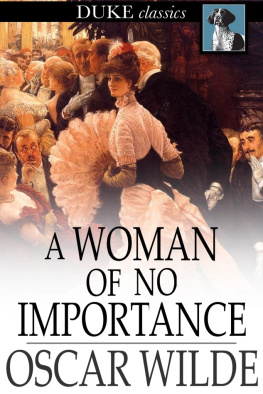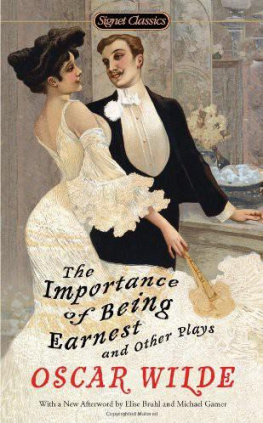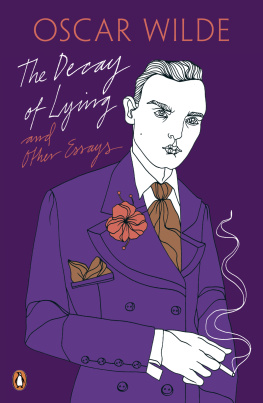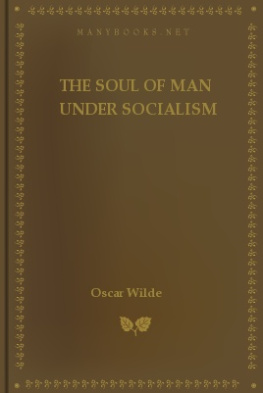Nicholas Frankel - Oscar Wilde: The Unrepentant Years
Here you can read online Nicholas Frankel - Oscar Wilde: The Unrepentant Years full text of the book (entire story) in english for free. Download pdf and epub, get meaning, cover and reviews about this ebook. year: 2017, publisher: Harvard University Press, genre: Detective and thriller. Description of the work, (preface) as well as reviews are available. Best literature library LitArk.com created for fans of good reading and offers a wide selection of genres:
Romance novel
Science fiction
Adventure
Detective
Science
History
Home and family
Prose
Art
Politics
Computer
Non-fiction
Religion
Business
Children
Humor
Choose a favorite category and find really read worthwhile books. Enjoy immersion in the world of imagination, feel the emotions of the characters or learn something new for yourself, make an fascinating discovery.

- Book:Oscar Wilde: The Unrepentant Years
- Author:
- Publisher:Harvard University Press
- Genre:
- Year:2017
- Rating:5 / 5
- Favourites:Add to favourites
- Your mark:
- 100
- 1
- 2
- 3
- 4
- 5
Oscar Wilde: The Unrepentant Years: summary, description and annotation
We offer to read an annotation, description, summary or preface (depends on what the author of the book "Oscar Wilde: The Unrepentant Years" wrote himself). If you haven't found the necessary information about the book — write in the comments, we will try to find it.
Oscar Wilde: The Unrepentant Years — read online for free the complete book (whole text) full work
Below is the text of the book, divided by pages. System saving the place of the last page read, allows you to conveniently read the book "Oscar Wilde: The Unrepentant Years" online for free, without having to search again every time where you left off. Put a bookmark, and you can go to the page where you finished reading at any time.
Font size:
Interval:
Bookmark:
OSCAR WILDE
THE UNREPENTANT YEARS
______
Nicholas Frankel


Cambridge, Massachusetts
London, England
2017
Copyright 2017 by Nicholas Frankel
All rights reserved
Text of Wildes letters and of De Profundis the Estate of Vyvyan Holland 1962, renewed 1990.
Extracts from Lord Alfred Douglass unpublished works 2017 John Rubinstein and John StratfordLiterary Executors of the Estate of Lord Alfred Bruce Douglasall rights reserved.
Cover photo by Roger Viollet Collection | Getty Images
Cover design by Lisa Roberts
978-0-674-73794-5 (alk. paper)
978-0-674-98202-4 (EPUB)
978-0-674-98203-1 (MOBI)
978-0-674-98201-7 (PDF)
The Library of Congress has cataloged the printed edition as follows:
Names: Frankel, Nicholas, 1962 author.
Title: Oscar Wilde : the unrepentant years / Nicholas Frankel.
Description: Cambridge, Massachusetts : Harvard University Press, 2017. | Includes bibliographical references and index.
Identifiers: LCCN 2017021767
Subjects: LCSH: Wilde, Oscar, 18541900ExileFrance. | Wilde, Oscar, 18541900Imprisonment. | Wilde, Oscar, 18541900Death and burial. | Authors, Irish19th centuryBiography.
Classification: LCC PR5823 .F67 2017 | DDC 828 / .809 [B]dc23
LC record available at https://lccn.loc.gov/2017021767
For Susan,
With love and gratitude
The artist must live the complete life, must accept it as it comes and stands like an angel before him, with its drawn and two-edged sword. I have had great success, I have had great failure. I have learned the value of each; and I now know that failure means morealways must mean more than success. Why, then, should I complain? I have at last come to the complete life which every artist must experience in order to join beauty to truth.
OSCAR WILDE, in conversation with Laurence Housman, September 1899
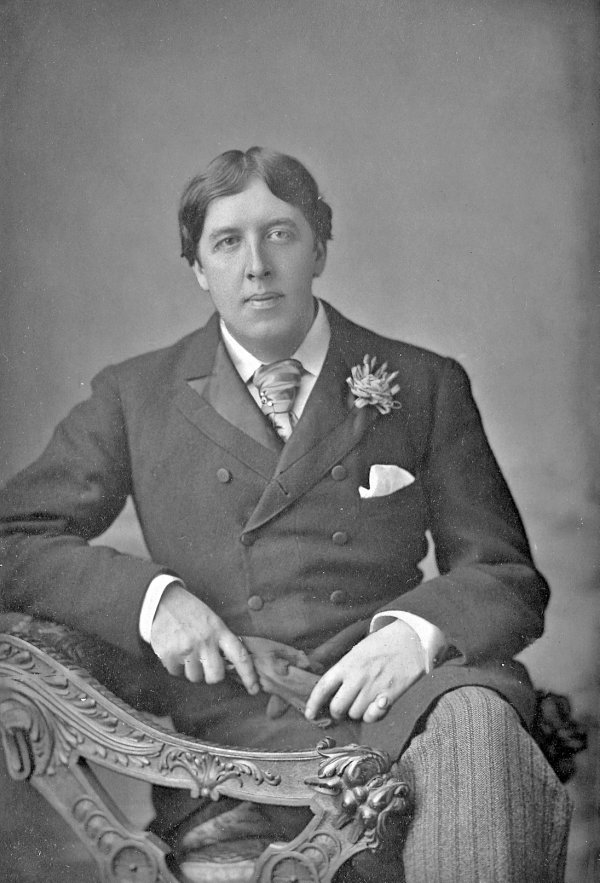
Oscar Wilde, 1889. Photograph by W. and D. Downey.
A T 6:15 A.M. on Wednesday, May 19, 1897, Oscar Wilde walked through the courtyard of Londons Pentonville Prison for the last time and climbed into a waiting horse-drawn carriage. After two years in regulation prison serge, he was now dressed in the same frock coat, silk hat, and patent leather boots he wore the day he was convicted and sentenced to prison with hard labor for the his two-year prison sentencea sentence that brought him to the point of suicide and insanity, in turn leading the authorities, in an effort to hide his torment from the public, to house him in three different jailsWilde was at last a free man.
For weeks, Wilde had been nervous about the moment of his release. I no doubt shall be very much upset and hysterical, he wrote a week earlier. transfer to Reading eighteen months earlier when, handcuffed and dressed in prison clothing, he had been spat at and jeered by crowds while changing trains at Londons Clapham Junction station. This time, the transfer was handled humanely.
Afraid he would be recognized on Londons streets, Wilde asked to be met with a little brougham with blinds or a closed brougham (CL 831, 833). He was by train and cross-Channel ferry to France, where rooms had been reserved at the Htel Sandwich in Dieppe, on the Normandy coast.
Wilde was not keen at all when informed of this plan shortly before his release. He told Turner that he didnt know Headlam very well, that he was afraid of strangers and disliked the idea of Dieppe, and that he would vastly prefer some quiet placea hotel in Euston Road or anywhere like thatto Headlams house (CL 833). He craved fresh clothes, a room to dress in, and a sitting-room, and he feared being recognized in the streets of London (CL 831). But it was to Headlams, a relatively short distance of two miles, that he was taken. A hotel, even in the Euston Road or anywhere like that, was out of the question.
Headlam later expressed surprise and it would only distress us both: I could talk to you of nothing but of the mode in which you very nearly [destroyed me] (CL 834). It is a mark of Adeys immense generosity of spirit and sensitivity to his friends suffering that he was willing to overlook these recriminations and meet Wilde at the prison gates two days later.
As the carriage made its way through the misty London streets, Wildes
It was a cold May morning, and if the newspaper placard was a grim reminder of the past, then Wilde was also entering a world that was entirely new to him. At the time of his arrest in April 1895, two of his plays, An Ideal Husband and The Importance of Being Earnest, had been running to packed houses in Londons West End (The Importance of Being Earnest Prison shortly after his arrest (CL 646). In prison I am going to test the power of love, he told Douglas one month later, to see if I cannot make the bitter waters sweet by the intensity of the love I bear you (CL 651).
But the Wilde who emerged from Pentonville had drunk deeply from bitter waters, and his love for Douglas had failed to make them sweet. His literary and social reputation Wilde had lost wife, children, fame, honour, position, [and] wealth, he wrote six months before his release: poverty was all that he [could] look forward to [and] obscurity all that he [could] hope for (CL 668).
Only his closest friends might continue to know him as Oscar of men while hoping that one of them will absolve him of his pact. If Sebastian suggests Wildes willingness to cast himself in the role of the martyr, Melmoth hints at the fundamentally transgressive nature of his life and art.
In the weeks before his release, Wilde also resolved to have nothing further to do with his lover Lord Alfred Douglas. Never mention in conjunction with mine that ill-omened and most unfortunate name, so fatal to me and to my house he wrote about Douglas to a friend in December 1896 (CL 674). By associating with one of [your] nature, I soiled and shamed my life irretrievably, he wrote to Douglas from Reading Prison, in a long unsent letter that unsparingly listed Douglass personal failings (CL 700). On no account should Douglas be informed of Wildes whereabouts upon release, Wilde told Adey two weeks before he left prison. But Wilde sought to reject more than just Douglas personally; there was something fatal in the very nature of his love, he had begun to think. Your love is the light of all my hours, he had written to Douglas in April 1895: our love was always beautiful and noble, and if I have been the butt of a terrible tragedy, it is because the nature of that love has not been understood (CL 64647). Eighteen months later, desire itself seemed a form of malady or madness: Tired of being on the heights, he wrote, I deliberately went to the depths in the search for new sensations (CL 730). In a petition asking the home secretary to commute his sentence on the grounds of incipient insanity, Wilde called his love for men the most horrible form of erotomania and a monstrous sexual perversion, one more properly treated as a disease to be cured by a physician than a crime to be punished by a judge (CL 656).
In short, Wilde had lost almost everything. Moreover, he had repudiated much of what he had not lost. As they drove off from Pentonville, Wildes companions doubtless explained the plans that had been unwittingly killed his children too, and if so, how would he channel his guilt and unhappiness at the thought?
Font size:
Interval:
Bookmark:
Similar books «Oscar Wilde: The Unrepentant Years»
Look at similar books to Oscar Wilde: The Unrepentant Years. We have selected literature similar in name and meaning in the hope of providing readers with more options to find new, interesting, not yet read works.
Discussion, reviews of the book Oscar Wilde: The Unrepentant Years and just readers' own opinions. Leave your comments, write what you think about the work, its meaning or the main characters. Specify what exactly you liked and what you didn't like, and why you think so.

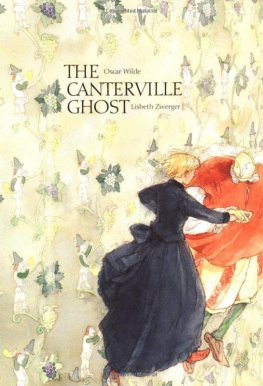
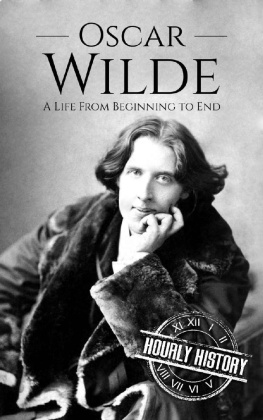
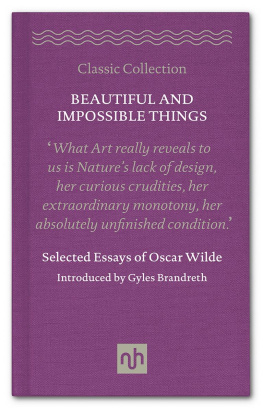
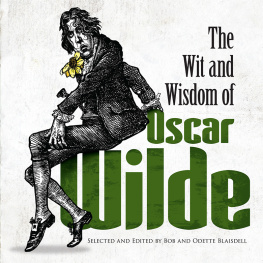
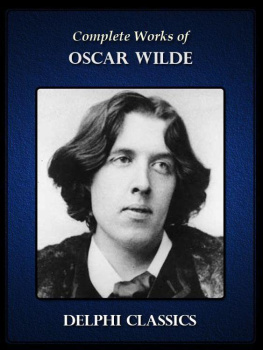
![Wilde Oscar - The secret life of Oscar Wilde: [an intimate biography]](/uploads/posts/book/228457/thumbs/wilde-oscar-the-secret-life-of-oscar-wilde-an.jpg)
